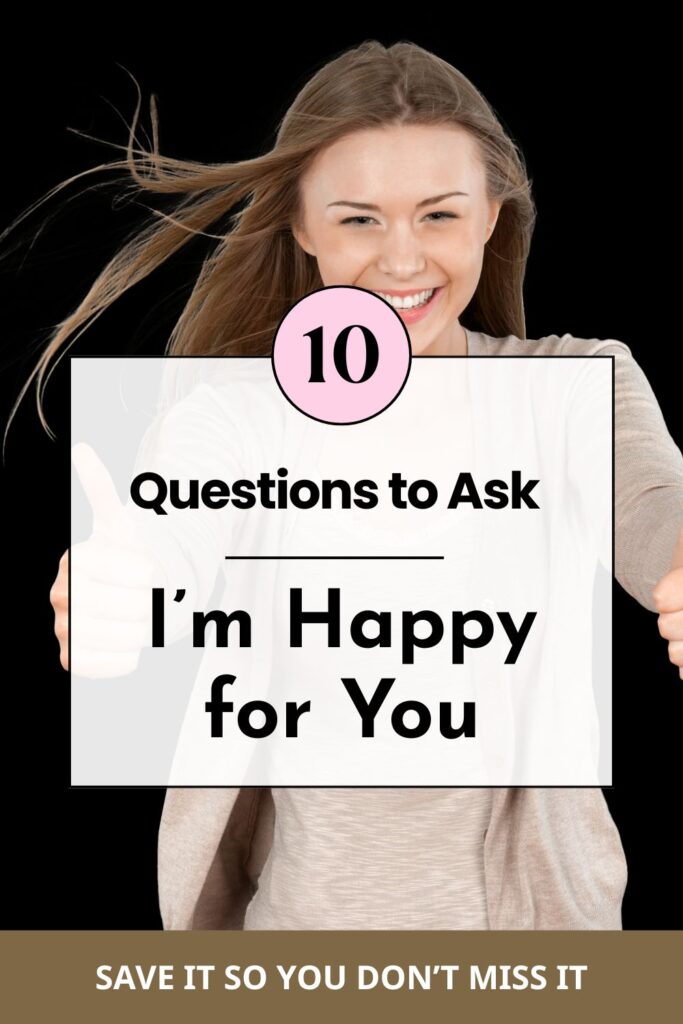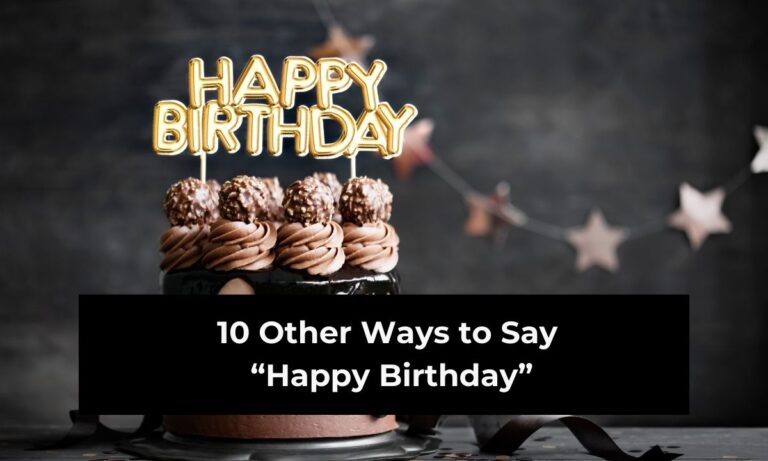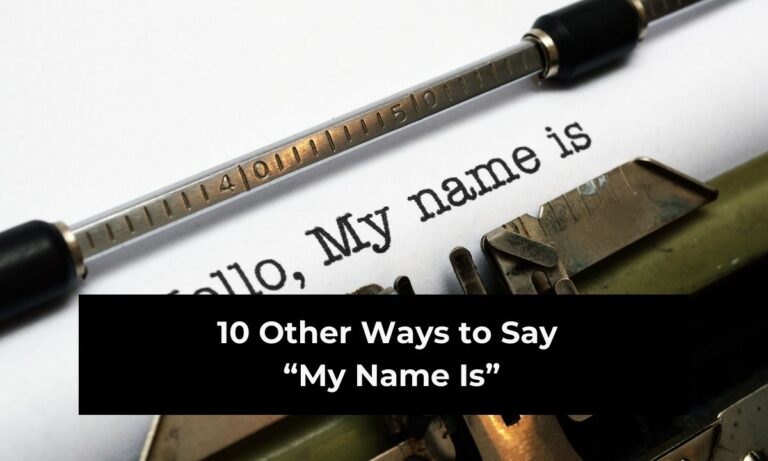When someone you care about achieves something big or shares good news, your natural reaction is to express happiness for them. But sometimes, simply saying “I’m happy for you” can feel a little repetitive or even flat. If you want your words to feel more thoughtful, creative, or warm, it helps to have other ways to say it.
Think about the last time a friend told you they got promoted, your sibling announced an engagement, or a colleague shared a personal win. You probably wanted to go beyond the standard response and really show that you were excited about their success. That’s where finding the right phrase comes in.

In this article, you’ll find 10 meaningful alternatives to “I’m happy for you.” Each one is broken down with examples and explanations, so you’ll know exactly when and how to use it. By the time you finish reading, you’ll have a variety of options to make your congratulations feel more personal, genuine, and memorable.
The best part? You’ll also strengthen your relationships by showing that you took the time to express your joy in a way that feels unique and authentic. Whether you’re writing a message, commenting on social media, or speaking face-to-face, these phrases will help you celebrate others with words that truly resonate.

Let’s dive in and explore the different ways you can brighten someone’s day by going beyond the usual “I’m happy for you.”
1. “That’s Wonderful News!”
When someone shares an accomplishment or milestone, saying “That’s wonderful news!” makes your joy feel immediate and genuine. This phrase emphasizes the positive impact of their achievement rather than focusing solely on your feelings.
Imagine your friend tells you they’ve landed their dream job. Instead of the standard response, you could say, “That’s wonderful news! You’ve worked so hard for this, and it’s inspiring to see it pay off.” By highlighting their effort, you show that you not only celebrate their success but also recognize the journey they took to get there.
This phrase works well in both casual and professional contexts. You can use it with family, close friends, or even colleagues when congratulating them on a big win. It feels natural in text messages, emails, and in-person conversations.
Another benefit of this alternative is its versatility. Whether it’s a small achievement—like someone finishing a project—or a major life event, such as buying a new home, “That’s wonderful news!” fits perfectly. It radiates warmth and makes the person feel like their happiness has spread to others, too.
Using this phrase is a great way to brighten someone’s day while keeping your words short and heartfelt. It’s proof that simple expressions, when said sincerely, can carry a lot of weight.
2. “I’m So Thrilled for You”
If you want to communicate excitement in a way that feels more enthusiastic, saying “I’m so thrilled for you” adds extra energy to your congratulations. The word “thrilled” conveys a stronger emotional reaction than simply being “happy.”
Picture your sibling announcing that they’ve gotten engaged. Instead of just saying “I’m happy for you,” you could reply, “I’m so thrilled for you! You deserve all the love and joy in the world.” Suddenly, your message feels elevated—it’s not only about acknowledgment but also about celebrating the depth of their happiness.
This phrase works best when you want to match someone’s excitement level. If the news is truly life-changing, like graduating from college, welcoming a baby, or starting a business, “I’m so thrilled for you” mirrors the significance of the moment.
It also shows that you’re emotionally invested in their journey. People love to know that their happiness matters to you, and this phrase reassures them that you share in their joy wholeheartedly.
In professional settings, you can adapt this slightly by saying “I’m absolutely thrilled for you” when congratulating a colleague. It maintains enthusiasm while keeping things respectful.
Choosing this alternative ensures your words don’t just sound polite—they sound full of genuine emotion.
3. “That’s So Exciting!”
Sometimes, good news deserves an energetic response that mirrors the thrill of the moment. “That’s so exciting!” is a vibrant alternative to “I’m happy for you” because it adds enthusiasm without being over the top.
For example, if a friend shares that they’re traveling abroad for the first time, saying “That’s so exciting! You’re going to have the most amazing adventure” makes your reaction feel encouraging and uplifting. It shows that you’re not just passively glad for them—you’re actively sharing in their excitement.
This phrase works well because it shifts the focus onto the opportunity or experience itself. Rather than centering on your feelings, you highlight the thrilling nature of what they’re going through. That helps the person feel validated and supported.
You can also adapt this for professional use. If a coworker announces they’re starting a new role or taking on a big project, you might say, “That’s so exciting—congratulations on this opportunity!” It’s upbeat without being too casual, making it versatile for different contexts.
The beauty of this expression is its adaptability. It can fit everyday wins, like someone trying a new hobby, as well as life-changing events like moving to a new city. It’s short, sweet, and always uplifting.
4. “Congratulations on Your Achievement”
When you want to sound polished and professional, “Congratulations on your achievement” is a perfect alternative. It acknowledges the person’s success in a way that feels formal yet warm.
This phrase is especially effective in professional settings, such as congratulating a colleague on a promotion, a client on an award, or a student on graduating. It shows respect for their accomplishment while maintaining a supportive tone.
For instance, if your coworker is recognized for completing a major project, you might write in an email, “Congratulations on your achievement. Your dedication and hard work have really paid off.” This wording not only celebrates their success but also recognizes the effort that went into it.
It’s also a timeless option for cards, speeches, and official announcements. Whether it’s a retirement celebration or an award ceremony, this phrase delivers congratulations with elegance.
Using this alternative is particularly valuable when you want your words to carry weight. By highlighting the achievement itself, you put the spotlight squarely on the person being celebrated. That makes the recognition feel earned and meaningful.
This phrase is proof that you don’t need fancy words to make someone feel appreciated—just sincerity and respect.
5. “I’m Overjoyed for You”
Sometimes, happiness over someone else’s success feels so big that “happy” doesn’t quite capture it. That’s where “I’m overjoyed for you” comes in. This phrase expresses a deeper, more heartfelt level of emotion.
Imagine your best friend tells you they’ve finally published their first book. Instead of the simple, “I’m happy for you,” you could say, “I’m overjoyed for you. I’ve seen all the late nights and dedication you’ve poured into this, and it’s amazing to see it come true.”
What makes this phrase powerful is the way it conveys personal investment. It shows that you’re not just glad for their success—you’re truly moved by it. That kind of expression can mean a lot, especially in close relationships.
It works particularly well in heartfelt conversations, personal messages, or big life milestones like weddings, graduations, or welcoming a baby. For professional settings, it might feel too emotional, but among friends and family, it’s perfect.
Using “I’m overjoyed for you” also makes the other person feel like their win is shared. It reminds them that their happiness extends beyond themselves and spreads to the people who care about them.
This phrase adds depth to your congratulations, making your words feel more personal and sincere.
6. “That’s Amazing—Well Done!”
Adding a touch of praise can make your congratulations feel extra encouraging. “That’s amazing—well done!” is a fantastic way to show happiness while also recognizing the effort behind the success.
Say your coworker just finished leading a successful project. You might say, “That’s amazing—well done! You really brought the team together and made this happen.” Not only do you celebrate the result, but you also highlight the hard work that made it possible.
This phrase is especially great for situations where the achievement required perseverance, creativity, or skill. It’s more than a polite response—it’s validation that their efforts truly paid off.
It works in both professional and personal contexts. Whether someone ran their first marathon, got accepted into their dream school, or mastered a new skill, “That’s amazing—well done!” shows that you see and appreciate the effort behind their milestone.
By adding “well done,” you also motivate them to keep striving. People love to feel recognized for their hard work, and this phrase does exactly that while keeping the tone light and encouraging.
7. “You Must Be So Proud”
Sometimes, the best way to share in someone’s joy is to reflect their pride back to them. Saying “You must be so proud” acknowledges not only their success but also the emotions that come with it.
For example, if your friend just graduated after years of studying, you could say, “You must be so proud—it’s a huge accomplishment, and you’ve earned every bit of it.” This phrase shifts the focus to how they’re feeling, which makes the message more personal and empathetic.
It works beautifully for major milestones, such as completing a degree, winning an award, or achieving a long-term goal. It’s also a thoughtful way to congratulate parents or loved ones who are proud of someone else’s accomplishments, like their child’s graduation or success in sports.
The beauty of this phrase lies in its ability to connect on a deeper emotional level. Instead of just offering congratulations, you acknowledge the pride and satisfaction that naturally come with success. That kind of recognition can be incredibly meaningful.
Whether used in personal messages or during heartfelt conversations, “You must be so proud” adds warmth and understanding to your words.
8. “I’m Celebrating with You”
When you want to make someone feel like you’re part of their joy, “I’m celebrating with you” is a wonderful choice. It communicates solidarity and excitement in a way that makes the other person feel less alone in their moment.
For instance, if your friend lands a big promotion, you could say, “I’m celebrating with you—you deserve this so much.” It lets them know that you’re not just observing their success but actively sharing in their happiness.
This phrase is especially effective when paired with an actual gesture of celebration. You might follow it up with an invitation to dinner, a small gift, or even a heartfelt note. The combination of words and actions amplifies the message.
It’s versatile, too. You can use it in personal contexts with family and friends, or even in professional environments to show team spirit. For example, if a coworker receives recognition, saying “I’m celebrating with you—it’s such a great achievement for the team” fosters connection and camaraderie.
Ultimately, “I’m celebrating with you” helps transform a congratulatory message into a shared experience. It deepens relationships and reminds people that their joy is multiplied when shared.
9. “That’s Truly Inspiring”
Some achievements do more than make you happy—they inspire you. Saying “That’s truly inspiring” is a meaningful way to show that someone’s success has left a positive impact on you.
Imagine a friend who has been working tirelessly to start their own business. When they finally launch, you could say, “That’s truly inspiring. Watching you follow your passion reminds me to keep pushing toward my own goals.” Not only do you celebrate their success, but you also acknowledge how it motivates others.
This phrase works particularly well for achievements that required resilience, courage, or determination. It’s not just about the end result—it’s about the journey and the example it sets.
In professional settings, this alternative can also serve as a powerful compliment. If a colleague earns recognition for leadership or innovation, saying “That’s truly inspiring” shows that their work makes a difference beyond just their personal success.
The beauty of this phrase is that it elevates your congratulations into admiration. It tells the other person that their success matters not just for them but also for the people around them.
By using “That’s truly inspiring,” you give your congratulations an extra layer of meaning that can make someone feel deeply appreciated.
10. “I’m Cheering You On”
Sometimes, success is just the beginning of a bigger journey. “I’m cheering you on” is a supportive phrase that not only celebrates the current moment but also shows encouragement for what’s ahead.
For example, if your friend is training for a marathon, you might say, “I’m cheering you on—you’re doing something amazing, and I can’t wait to see you cross that finish line.” It celebrates their progress while offering motivation for the future.
This phrase is perfect for ongoing goals, challenges, or journeys. Whether someone is starting a new job, pursuing a degree, or working toward personal growth, “I’m cheering you on” reassures them that they have your support every step of the way.
It’s also a phrase that builds connection. People love knowing that others believe in them, and using this expression makes your encouragement feel more personal and active.
Unlike simple congratulations, “I’m cheering you on” goes beyond the present moment. It signals that you’re invested in their future success, not just their current win.
This phrase is a thoughtful way to remind someone that they’re not alone—that they have people rooting for them in every step of their journey.
Conclusion
Finding the right words to celebrate someone’s happiness can make all the difference. While “I’m happy for you” is kind and sincere, using alternatives like “That’s wonderful news,” “I’m so thrilled for you,” or “I’m cheering you on” adds more color and warmth to your message.
By choosing expressions that reflect enthusiasm, admiration, or encouragement, you make your congratulations feel more personal and memorable. Whether it’s for a close friend, a family member, or a colleague, these alternatives help you connect on a deeper level and show that their joy truly matters to you.
At the end of the day, celebrating others is about more than words—it’s about making them feel valued and supported. The next time someone shares good news with you, try one of these alternatives and watch how it strengthens your bond while spreading even more joy.
FAQs
1. Why should I use alternatives to “I’m happy for you”?
Using alternatives helps your congratulations feel more genuine, personal, and memorable. It shows that you’ve put thought into your response.
2. Can I use these alternatives in professional settings?
Yes. Phrases like “Congratulations on your achievement” or “That’s wonderful news” work perfectly in formal or workplace environments.
3. Which phrase works best for close relationships?
Expressions like “I’m overjoyed for you” or “I’m celebrating with you” are heartfelt and work beautifully with family and friends.
4. What should I say when someone achieves a long-term goal?
Phrases such as “You must be so proud” or “That’s truly inspiring” highlight the effort and perseverance behind the success.
5. How can I make my congratulations feel even more special?
Pair your words with actions—write a card, send a thoughtful gift, or spend time celebrating together. Actions amplify the sincerity of your message.





